Danielle Laidley in stunning fashion photo shoot
“It’s been a choice to live authentically . . . or leave this world in pain.” Danielle Laidley has embraced her femininity in a fashion shoot, while revealing the despair she felt at times on her journey.
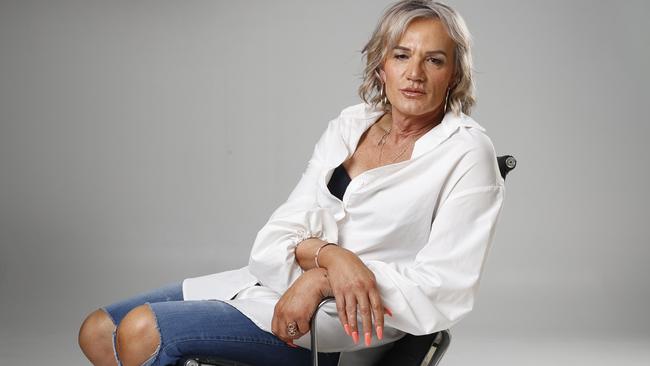
Victoria
Don't miss out on the headlines from Victoria. Followed categories will be added to My News.
A football lurks in the corner of the photographic studio.
Will Danielle Laidley, the ex-AFL player and former AFL coach, pose in high heels and a mini-dress while grasping the football in a manicured hand?
Of course she will.
Over three hours, she sports various outfits, each a statement in fashion and identity.
She chooses a printed fitted dress, leather pants, black stilettos and a cleavage-revealing frilly blouse.
Her smile doesn’t come naturally, not at first, even if makeup and Hollywood lights are a normal part of each day.
Her partner Donna makes faces behind the photographer to inspire a laugh.
Laidley responds with a middle finger, and a smirk, as Donna compares “Queen Laidley” with Audrey Hepburn.
“I don’t get out of bed for less than 10k a day,” Laidley says, mimicking a supermodel.
She enjoys the piles of clothing choices and the fussing.
It’s like those private moments at home, though she’s rather taken with the studio smoke effects, the props, the stylist, the makeup artist and the dogsbody assistants.
Her agreeing to photos with a football seems telling.
The ball in her grip unites the person she once appeared to be and the woman she always was.
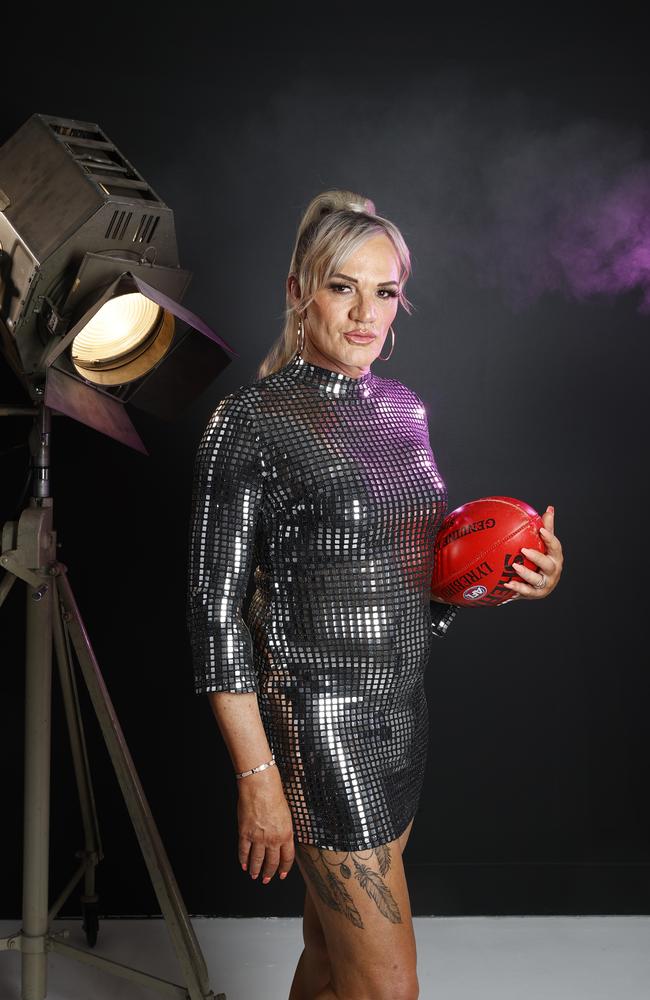
The two identities do not reconcile neatly.
Laidley was once a reluctant public speaker, yet she is now a willing poster girl for a life decision which confronts and confuses some people unfamiliar with her journey.
Laidley’s public profile dates to the 1980s as a 17 year old with hidden doubts.
She didn’t thrive, or so Danielle says now, over 28 years in the main window of the football goldfish bowl.
Like Caitlyn Jenner and her former identity of Bruce, Danielle thinks of Dean Laidley as another person, though the identities of Danielle and Dean blend as “I”.
Jenner’s approach to transitioning has riled elements within the transgender community.
Yet like Jenner, Laidley used elite sport (and a workaholic adherence to her job) to avoid confronting her gender identity.
The younger Laidley was withdrawn.
Although sometimes the life of the party she could become unsociable and dismissive at times.
She was nicknamed “The Bible” because she was so hard to read.
Laidley would laugh along with everyone, but wished she could tell the truth about what lied beneath.
She was terrified that someone would discover the lifelong burden.
She was alone, in what she felt as a “gap” between her and everyone else.
She doesn’t regret keeping that secret of gender dysphoria for almost half a century. Laidley, now 54, loved married life and being a father of three treasures.
The problem was living a life so compartmentalised slowly wore her down, pretending to be someone she was not.
It is liberating to be yourself after so long, to parade in gold bangles and earrings, to be part of a “new tribe” as Laidley calls it.
RETURN TO THE ROOS
She describes her first public outing, by choice that is, when she returned to her old club North Melbourne last week and blended her old tribe with her new one.
There were flutters before she left home.
She noted the flurry of photographers when she arrived, and she felt decidedly vulnerable as she walked to the stage to speak on a panel.
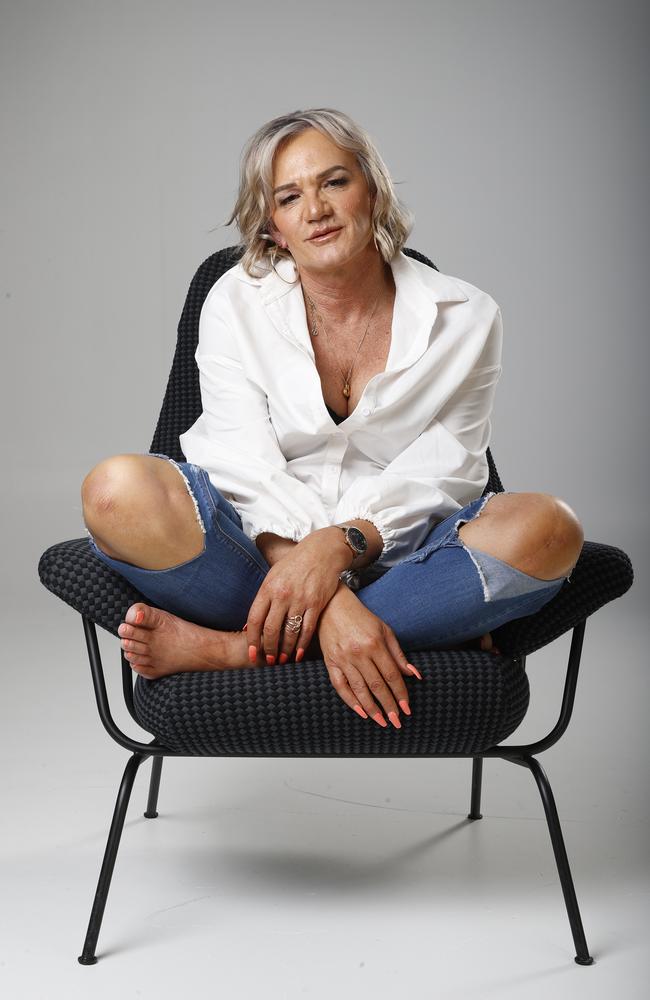
Donna, who accompanied her, shows internet coverage depicting Danielle’s gold “D” earrings. She feels bemused by the frenzy of a tiny portion of social media commentary of the event.
Yet the warmth was otherwise universal.
The media presented the event as a major milestone.
Laidley looked relaxed and at home, both with herself and her surrounds.
She was being accepted for who she was and who she always had been.
What happened later that day is just as instructive.
Laidley gave a speech in Torquay for Transgender Awareness Week.
On stage, she had to stop several times as she told her story.
“Not only the messages of support but the messages from parents of transgender children and the impact that last Friday had has absolutely blown me away,” Laidley says.
“I want to raise awareness of transgender people to live life without barriers.
It’s very important to me, and not just the transgender person themselves, but also their families for the support and counsel required to adapt to change.”
THE SPIRAL
Laidley’s story is unusual and moving.
Some of the hardest moments for her and her family were when photos of Laidley surfaced, circulated by police after her arrest in May last year.
This was the public’s first glimpse of Danielle Laidley.
She appeared to be drug-addled in a mug shot.
Unwigged, her mascara smudged, Laidley’s chin was lifted in what could be mistaken for a sneer.
In another leaked photo, she wore long blonde hair, looking anguished in a police interview after she was picked up outside her apartment in St Kilda.
The police found methamphetamine in her bra.
Laidley was charged with stalking and other offences and remanded to custody.
There, she suffered more shame and sleeplessness. It was a low point, Laidley admits, spending nine days in the psychiatric unit after self-harming a month earlier — it was perhaps the lowest. Yet the spiral started much earlier.
Laidley’s descent could have been just another case study in addiction and a refusal to seek help.
Instead, the world was invited to contrast what it thought they knew of a public figure, and what the headlines of the case (along with the photos) suggested otherwise.
Sympathy was smudged by courtroom descriptions of the apparently unhinged manner of Laidley’s choices, which included a woman receiving both messages and overtures from Laidley.
Getting bail meant 28 days in rehab.
Legal issues which she cannot discuss persist to this day.
Laidley doesn’t deflect the seriousness of her difficulties.
Indeed, she will one day share her unvarnished recall of events. But the coverage of her “fall” hurt.
“I’ve sat back the last 18 months and not said a word for lots of different reasons,” she says. “How it was portrayed, written from hearsay and perception, was just outright wrong about the gender stuff. That hurts me and it hurts my family.”
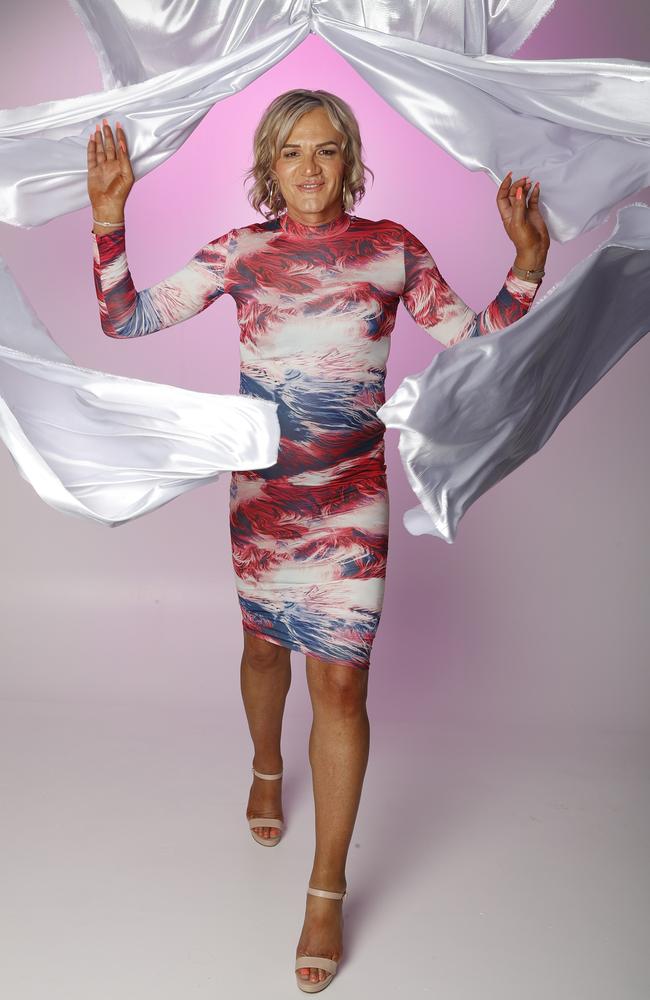
She remembers the date. She always will. It was April 5, 2020, four weeks before her arrest, when she tried to take her own life.
“I’m bloody happy now that that wasn’t the case because I want to live, I want to enjoy my life,” she says.
“I just want to keep being a better person, the best woman I can be, and be the best parent, partner, friend, colleague – all those things I probably wasn’t before because of certain reasons. It’s been a choice to live authentically as myself or leave this world in pain.
“I just feel like I’ve peeled back so many layers. It’s been tough at times. But I feel I am a much more rounded person. I feel that I can let myself love and be loved now instead of self-sabotaging in lots of different ways from an early age right up until 18 months ago.”
FINDING PEACE
Laidley dares to hope that she has found “peace at last”.
But she acknowledges her decisions are more tangled for those around her.
Presenting as transgender is powerful and life-changing for the person, but can also be confusing and hurtful for loved ones.
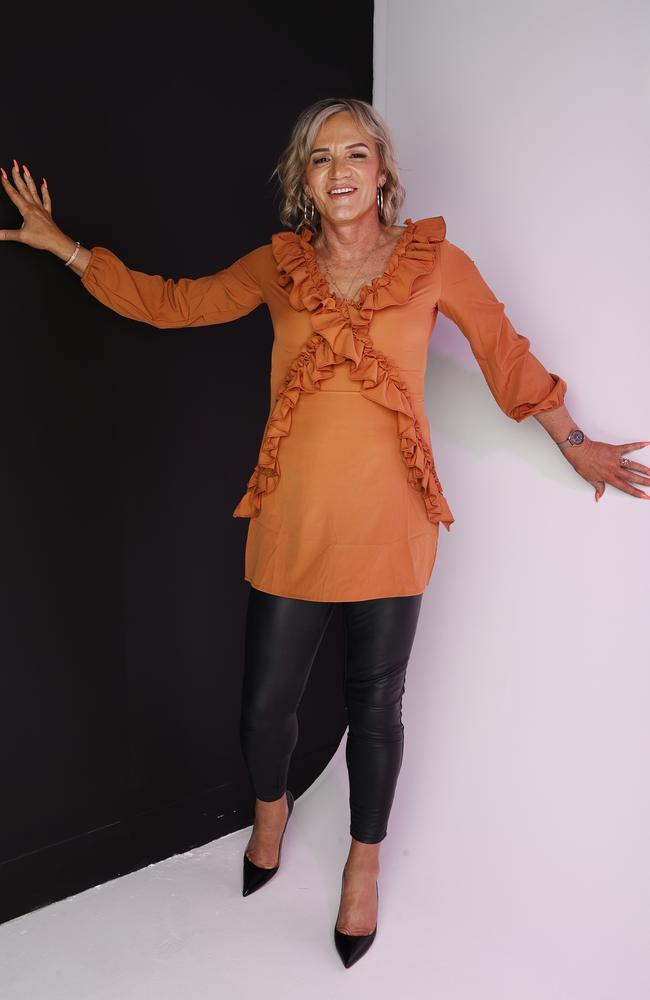
Grief for who is lost can clash with doubts for who they have become.
Some of Laidley’s family is wrestling with her transition.
“At the end of the day I’m me and there’s light at the end of the tunnel of the emotional rollercoaster that has taken its toll,” she says.
“I will continue to reach out to family members who are still grappling, and that is understandable. I put myself in their shoes every day.”
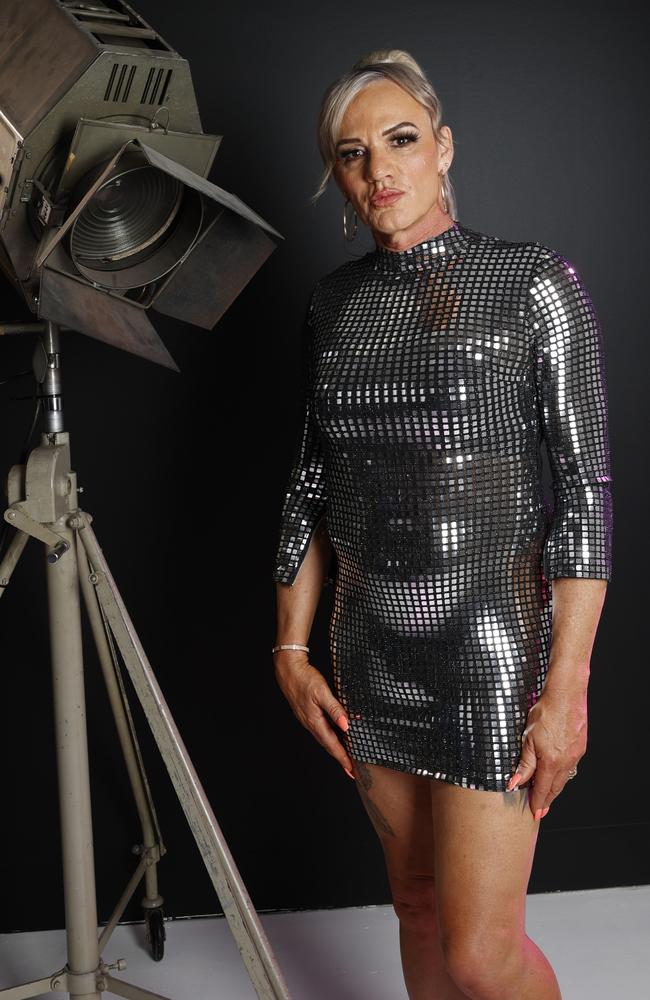
Football is marbled through Laidley’s history. Flags were won and missed. But the usual tales of triumph and adversity are background to the Laidley history.
Laidley succeeded in a culture of testosterone, masculinity and jocularity.
Her toughness was stamped with a Junkyard Dog nickname in the playing days.
As a senior coach of an under-resourced club which reached the finals three times in four years, Laidley was later a master matchday strategist.
Laidley could praise players at length, but was moody, too, sometimes unapproachable. The coach at times seemed troubled and tortured.
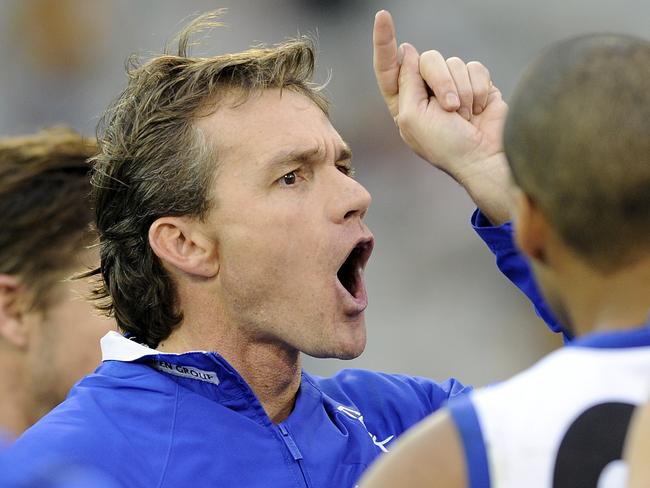
“You take on the job at 35,” she says of coaching, “and seven years later you feel like you’ve got a foot in the grave for lots of different reasons. Physically and mentally I was just absolutely exhausted on top of the other issues which are quite public now.”
Laidley took on assistant roles at other AFL clubs.
There were telltale quirks, which swirled as unconfirmed rumours, but Laidley told no one in football about her true self as a player or senior coach.
A few years ago, the AFL structures and the discipline they demanded fell away. Laidley’s self-described weaknesses reared.
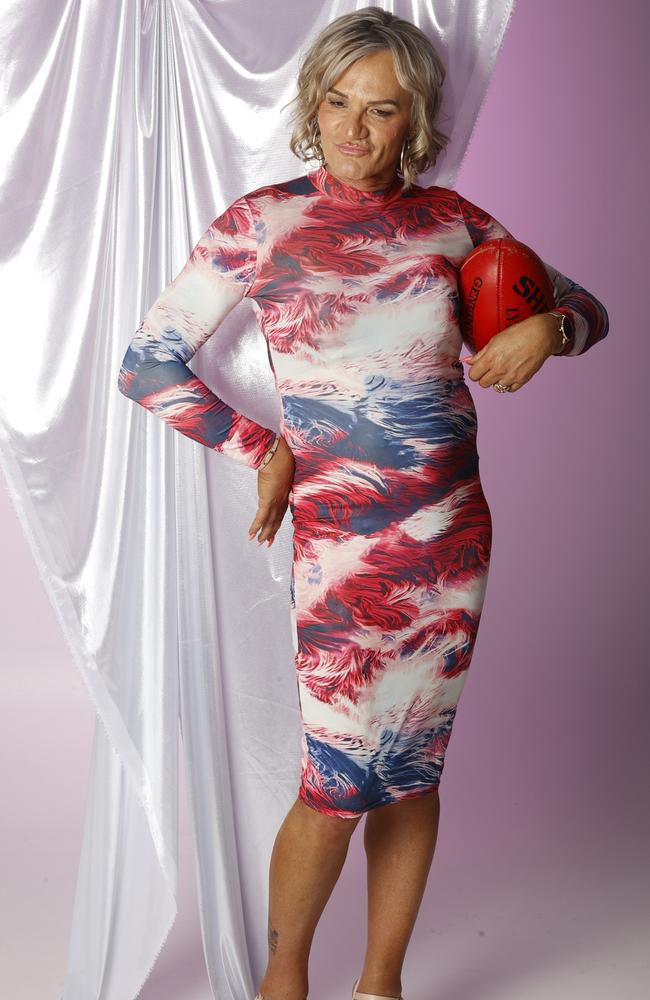
She had fretted about addictive traits since her teenage years.
A family history stretches back generations.
Laidley, the football person, would have a beer, but usually not many. The untold part of the story is implied. That as Laidley confronted long denied pain, confusion and fear, she found release in vices.
VULNERABLE AND ASSERTIVE
There is a candour to Laidley, a self-effacing acceptance. She projects trust unlike her former self.
She can seem both vulnerable and assertive in the same sentence.
A misplaced pronoun wouldn’t faze her, you suspect. She speaks of addictive patterns and behaviours in the past tense. She seems unlikely to ever preach about how society let her down.
Her femininity is bold, built on self-awareness.
Her plain words seem to be styled more by her embracing of who she is rather than her growing up in hardscrabble suburbia in Perth.
There is humour, such as her take on rehab, when clients would go to a nearby oval for a kick of the footy. When she nailed a goal from 35m, a passer-by declared: “She’s got a fair kick on her.”
She is softly spoken and careful with her words. She says mistakes cannot be undone, but can be shared so that others do not replicate them.
It will all go into a book, set to be published by HarperCollins in September next year. If she deliberately avoids details for now, Laidley does want all the truth out there, on her terms.
She hopes that close family members still grappling with her true self will come to understand why this is the only way.
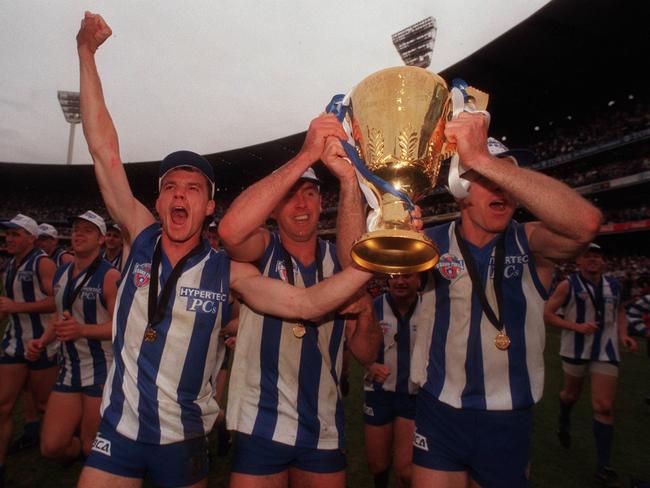
She has made mistakes, as have others.
Some things she could control, others she could not.
“I have been their role model and their rock and now there’s a gap there,” she says of family members. “I want them to take their time to absorb it because I want them to be proud of me again. I want them in my life. I want them to want me back in their life.”
Donna and Laidley first met in Grade 1 in Western Australia.
They were forced to sit together because, as left-handers, they were different. Donna still remembers Laidley’s long blonde hair. They were partners in the childhood sense of romance, in both primary and high school, and they reconnected a few years ago.
Does Laidley wish she transitioned earlier in life?
“There’s just too many layers to it,” she says. “I can say ‘yeah, of course’. But I loved my wife, I love my kids unconditionally. I wouldn’t change anything.”
HarperCollins head of nonfiction, Helen Littleton, describes Laidley’s story as an extraordinary twist on the self-discipline and focus of elite sport.
“I know she will write a timely and inspiring story that will remind us of the importance of acceptance in all our lives,” Littleton says.
“It will be one of 2022’s most important memoirs.”
Off camera, Laidley has been supported by many players and friends from the AFL. They include Mark Brayshaw, Anthony Stevens and Wayne Schwass in a very long list of names.
After catching up with former West Coast teammates, Laidley wrote down their lasting message of support.
They wanted to make the next 30 summers of her life as fulfilling as they could be.
Back in casual clothes, late for another appointment, Laidley offers a parting adage to explain who she is and why she wants the world to know. “Don’t be ashamed of your past or your story,” she says.
“It just might inspire someone else.”




